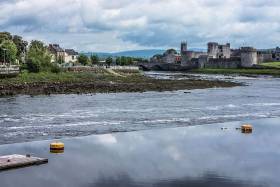Displaying items by tag: Paddle for Peace
Yukon Challenge Kayakers To Recreate ‘Paddle For Peace’ From Enniskillen To Limerick
An experienced kayaker in training for the world’s longest non-stop paddle race also aims to recreate the ‘paddle for peace’ that celebrated the signing of the Good Friday Agreement.
In 1999, Jim Kennedy and friends showed their support for the historic peace treaty by kayaking from Enniskillen to Limerick along the then reunited Shannon and Erne systems.
“We formed a team of like-minded people from both sides of the border to achieve this,” Kennedy says. “From Enniskillen we had Noel Maguire and from the south we had Pat McCarthy, with Maria Kennedy and Vicky Platt at a bank support team.
“On the way we called on schools and they supported us by doing peace projects in the class room and cheering us on as we passed.”
Kennedy recalls the many villages and towns that hosted the paddling party as they progressed: “We were given a plaque and message of peace by Fermanagh council to deliver to the Limerick County Council. We planted trees of peace in many villages along the way.”
Sections that would have been otherwise impassable were cleared for paddling thanks to the aid of Civil Defence, who opened canal locks, and the ESB, who allowed passage through the Ardnacrusha hydroelectric plant.
Years before the age of social media, the journey, as Kennedy says, “evolved into a great show of support for peace from both ends of the waterways and from all walks of life”.
Twenty years on, there is a generation that has never known the violence of the Troubles first-hand. However, Kennedy says, “we again find ourselves frustrated at all the goings on in the world and are hoping in our small way to draw attention to and celebrate 20 years of peace in Ireland”.
Once more, Kennedy plans to kayak the more than 200 miles from Enniskillen to Limerick, carrying another plaque of peace from council to council.
Noel Maguire and Pat McCarthy have also signed on for the repeat adventure — as has Colin Wong, with whom Kennedy will be taking on the Yukon 1000 challenge in Canada and Alaska next summer, as previously reported on Afloat.ie.
“We hope that many other paddlers from north and south will join in along the way,” Kennedy says. “Should you be interested in joining in or finding out more about this celebration paddle, just let us know or give us a peaceful shout out as we pass by!”
Get in touch with Jim Kennedy via the Facebook page for Atlantic Sea Kayaking.





























































